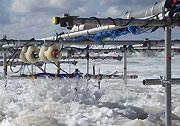The secrets of the beach
UNSW researchers are part of an international group of 90 experts looking at how climate change will affect the world's coast lines.
UNSW researchers are part of an international group of 90 experts looking at how climate change will affect the world's coast lines.

Preliminary research results from the windswept coast of southern France suggest an extraordinary but little understood mathematical equilibrium has been keeping the world's coastlines largely intact, despite the vagaries of the weather.
The urgent question is whether even small changes in sea levels due to climate change will wreck this natural balance and trigger devastating coastal erosion.
The key measurements have been recorded on equipment constructed by a joint UNSW and University of Plymouth (UK) team, in what is believed to be the single largest array of scientific instruments ever deployed in experimental coastal research. On the remote beach at "Le Truc Vert", literally 'the green thing', in Bordeaux, a group of 90 international researchers are hoping to unlock the secrets of coastal seabed movement and in doing so map the likely impact of climate change on coastlines.
UNSW's Dr Ian Turner says preliminary results show a single wave can shift the sea bed by up to 2cm and move large amounts of sand. Over a three week period total movements of 100 metres were recorded, he says. But, nature is constantly seeking equilibrium, and no matter how extreme the short term movements, over a tidal cycle the actual change in the beach is very small.
"The beach is constantly changing over short time periods, but over weeks nature rights itself and we have no idea why," he said.
"We need to understand the fundamental science behind this balance between the erosion and deposition of sand."
Dr Turner, who has been working in France with his colleague from UNSW's Water Research Laboratory, Dr Chris Blenkinsop, says the research confirms that the world's beaches are very sensitive environments. In Sydney, the research will be especially relevant to UNSW's work on the exposed Collaroy Beach coastline, which is vulnerable to erosion and could be devastated by rising sea levels.
"Relatively small changes in the wave climate could cause relatively large impacts on beaches, in the same way small temperature changes can disrupt natural ecosystems," said Dr Turner.
"But, it is also possible our research could show that because beaches have this ability to find a natural equilibrium they may have the ability to adjust to rising sea levels."
The first step, he said, is to model this extraordinary natural equation once tests are completed in Bordeaux. The international research team is being hosted by Bordeaux University and the French Navy.
Media contact: Peter Trute | 0410 271 826 | p.trute@unsw.edu.au